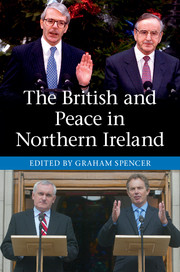Book contents
- Frontmatter
- Dedication
- Contents
- Notes on contributors
- Acknowledgements
- Brief chronology of the peace process
- Abbreviations
- Key documents
- Introduction
- 1 The terrain of discourse
- 2 The Anglo-Irish Agreement: an interview with Sir David Goodall and Lord Armstrong of Ilminster
- 3 The constitutional issue in Irish politics
- 4 Negotiations and positions: an interview with Sir John Chilcot
- 5 Resolving intercommunal conflict: some enabling factors
- 6 Tactics, strategy and space
- 7 The Joint Declaration and memory
- 8 Movement and transition in 1997: Major to Blair
- 9 The challenge of symmetry in dialogue: an interview with Sir Joseph Pilling
- 10 Why was the Good Friday Agreement so hard to implement?: lessons from ‘Groundhog Day’, 1998–2002
- 11 Text and context: an interview with William Fittall
- 12 The nature of dialogue: an interview with Sir Jonathan Phillips
- 13 Managing the tensions of difference: an interview with Jonathan Powell
- Conclusion
- Index
11 - Text and context: an interview with William Fittall
Published online by Cambridge University Press: 05 March 2015
- Frontmatter
- Dedication
- Contents
- Notes on contributors
- Acknowledgements
- Brief chronology of the peace process
- Abbreviations
- Key documents
- Introduction
- 1 The terrain of discourse
- 2 The Anglo-Irish Agreement: an interview with Sir David Goodall and Lord Armstrong of Ilminster
- 3 The constitutional issue in Irish politics
- 4 Negotiations and positions: an interview with Sir John Chilcot
- 5 Resolving intercommunal conflict: some enabling factors
- 6 Tactics, strategy and space
- 7 The Joint Declaration and memory
- 8 Movement and transition in 1997: Major to Blair
- 9 The challenge of symmetry in dialogue: an interview with Sir Joseph Pilling
- 10 Why was the Good Friday Agreement so hard to implement?: lessons from ‘Groundhog Day’, 1998–2002
- 11 Text and context: an interview with William Fittall
- 12 The nature of dialogue: an interview with Sir Jonathan Phillips
- 13 Managing the tensions of difference: an interview with Jonathan Powell
- Conclusion
- Index
Summary
Interview
GS: Can you explain the mechanics of drafting text?
WF: I think it depends a lot on the nature of the document that you are talking about. To go back to 1992, which was my first intensive involvement in Northern Ireland business, the name of the game was constitutional talks. That meant the political parties excluding Sinn Féin, because at that point the PIRA was still waging a campaign. There was a lot of formal text around the three strands involving the Ulster Unionist Party (UUP), the Democratic Unionist Party (DUP) and the Social Democratic and Labour Party (SDLP). We produced it within the Northern Ireland Office (NIO) both in preparation for and during those talks. They did not in the event get that far, but at the time they did break what appeared to be a number of logjams and achieved what were a number of ‘firsts’. There had to be a substantial quantity of text, not least because in Strand 1 the aim was to try to secure agreement on what new devolved institutions of government would be. With those sort of exercises, when you were into constitutional matters and defining the powers of bodies, by definition the text had to be full, comprehensive and deal with all the issues, and it had to be pretty careful. If you come to a different phase, such as when I was involved from 2000 to 2002, the dynamic was different. The PIRA had gone to a ceasefire in 1994, come off in 1996 and then gone back on again after the 1997 election. You then had the 1998 Agreement and the subsequent successful cross-border referenda. So it was a very different phase. We were much more into crisis management, running repairs and rescue operations. Essentially, following the Agreement it took a long period before devolved government was established mainly because the Agreement had been so contentious within the unionist community, and from the outset David Trimble, who had done the deal, was under huge pressure. To many unionists it seemed that the republican movement had got onto the ‘inside track’ and had achieved a position of great influence, while still having a private army that might be reactivated as and when. And decommissioning had not happened. So, in August 2000, it was all about private negotiations over what might eventually emerge with quite spare public texts to try to help David Trimble stay in government. Therefore, you are talking about a different sort of texts and you cannot talk about text as if it is a singular, indivisible thing.
- Type
- Chapter
- Information
- The British and Peace in Northern IrelandThe Process and Practice of Reaching Agreement, pp. 252 - 276Publisher: Cambridge University PressPrint publication year: 2015



